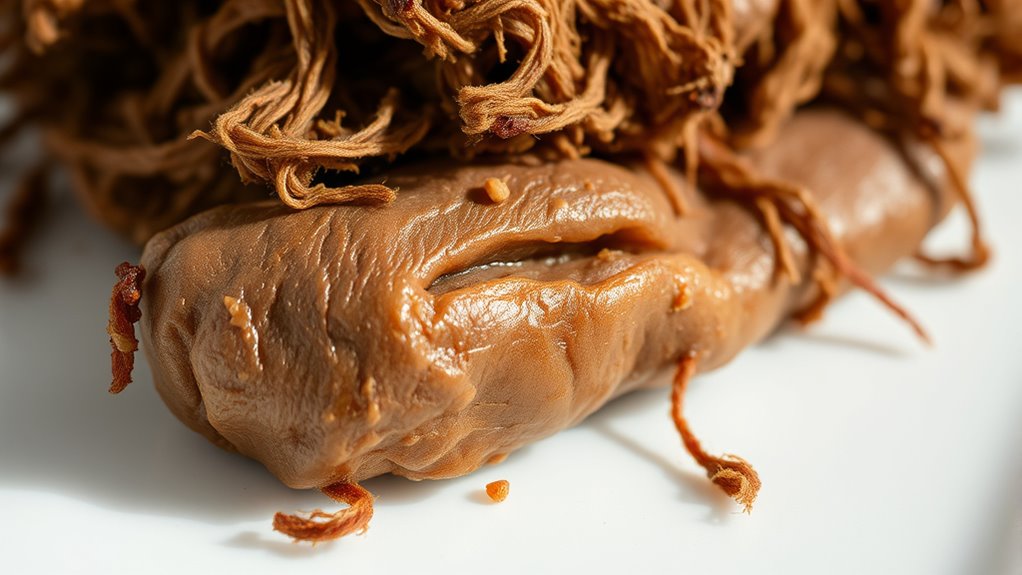If your stool smells different, it could be due to changes in your diet, like eating more fiber or fermented foods, or because of slower digestion from less fiber intake. Gut bacteria play a big role too; they influence smell through fermentation. Medication, especially antibiotics, can also alter odor. Usually, these changes aren’t alarming, but if they persist or worsen, it’s best to pay attention. Stay with me to uncover more about what your stool’s scent might be telling you.
Key Takeaways
- Changes in diet, especially fiber intake, can alter stool odor by affecting gut bacteria and fermentation processes.
- Medications like antibiotics or iron supplements can disrupt gut flora, leading to noticeable smell differences.
- Slow digestion or constipation may cause foul-smelling stool due to increased fermentation of waste.
- Persistent or sudden odor changes accompanied by symptoms such as pain or blood may indicate underlying health issues.
- Tracking diet, medication use, and symptoms helps determine if odor changes are normal or warrant medical attention.

Changes in stool smell can be a sign that something in your digestive system has shifted. If you’ve noticed your stool suddenly smells different, it’s natural to wonder what’s causing it. One common factor is your diet, especially your fiber intake. Fiber plays a vital role in how your body processes waste. When you increase your fiber intake, you might notice a change in stool odor because fiber helps bulk up your stool and promotes healthy bacteria in your gut. This bacteria, in turn, influences the smell, often making it less offensive. Conversely, a sudden drop in fiber can lead to slower digestion, which might cause stool to smell more foul due to fermentation and longer transit times. So, paying attention to your fiber intake can give you clues about changes in stool smell and overall gut health.
Another essential influence on stool odor is medication effects. Certain medications can alter the natural balance of bacteria in your gut or affect digestion directly, leading to noticeable changes in stool smell. For example, antibiotics are notorious for disrupting gut flora, sometimes causing your stool to smell more intense or different altogether. Other medications, like iron supplements or some pain relievers, can also change stool odor by affecting how your body processes waste or altering bacterial populations. If you’ve started a new medication and notice a change in smell, it’s worth considering whether the drug might be the culprit. Sometimes, these effects are temporary, but in other cases, they can signal that your gut bacteria are being profoundly impacted. Additionally, some home theatre projectors are equipped with features that support better color accuracy, which can enhance your viewing experience.
It’s also essential to recognize that changes in stool smell from medication or diet are usually not a cause for alarm if they’re temporary and you feel okay overall. However, persistent or sudden changes accompanied by other symptoms—like pain, diarrhea, or blood—should prompt you to seek medical advice. It’s your body’s way of telling you something might need attention. Monitoring your diet, especially fiber intake, and being aware of any new medications can help you understand what influences your stool’s smell. Keeping a log of these factors can be useful if you need to discuss your symptoms with a healthcare professional. Ultimately, while a change in stool smell can be normal and linked to diet or medication, listening to your body and noting any additional symptoms is key to maintaining your digestive health.
Frequently Asked Questions
Can Medication Alter Stool Odor Significantly?
Yes, medication can markedly alter stool odor due to side effects or prescription interactions. I’ve noticed that antibiotics, for example, often change the smell because they disrupt your gut bacteria. Some medications may also cause digestive changes, leading to stronger or unusual odors. If you notice a persistent or strange smell, it’s best to consult your doctor, as it could signal a reaction or an underlying issue needing attention.
Does Stool Smell Indicate Specific Health Conditions?
Absolutely, stool smell can signal specific health conditions. I’ve noticed that changes might point to gut bacteria imbalances or enzyme issues, which can influence digestion and odor. If your stool suddenly smells markedly different or foul, it’s worth watching for symptoms like discomfort or diarrhea. I recommend consulting a healthcare professional if you’re concerned, as these odors can sometimes reveal underlying problems that need proper diagnosis and treatment.
How Quickly Can Diet Changes Affect Stool Smell?
Diet changes can affect stool smell within a day or two, especially if you adjust your fiber intake or hydration levels. Increasing fiber can make your stool smell less strong, while dehydration might intensify odors. I’ve noticed that staying well-hydrated and eating a balanced diet quickly alters how my stool smells, often within 24 to 48 hours. So, small tweaks can have noticeable effects pretty fast.
Are There Natural Remedies to Normalize Foul-Smelling Stool?
Think of your gut as a garden needing care. I recommend herbal remedies like ginger or chamomile to soothe digestion, and probiotic solutions to restore healthy bacteria. These natural remedies can help normalize foul-smelling stool. I’ve found that consistency is key—adding these to your routine may improve your gut health and reduce unpleasant odors, making your bathroom visits more comfortable. Always check with a healthcare provider if issues persist.
Is Persistent Foul Stool Odor a Sign of Infection?
Yes, persistent foul stool odor can be a sign of infection. It might indicate a bacterial imbalance or even a parasitic infection that disrupts your digestion. If you notice this odor lasting longer than usual, I recommend consulting a healthcare professional promptly. They can diagnose the cause, whether it’s an infection or another issue, and suggest appropriate treatment to restore your digestive health.
Conclusion
So, if your stool suddenly smells different, don’t panic right away. Sometimes, it’s just your diet or a temporary change in digestion. But if the smell persists, or you notice other symptoms, it’s worth talking to a doctor. I get it—health concerns can be scary. Still, paying attention and acting early can make all the difference. Trust your instincts, stay aware, and remember: most changes aren’t serious, but it’s always better to be safe than sorry.









